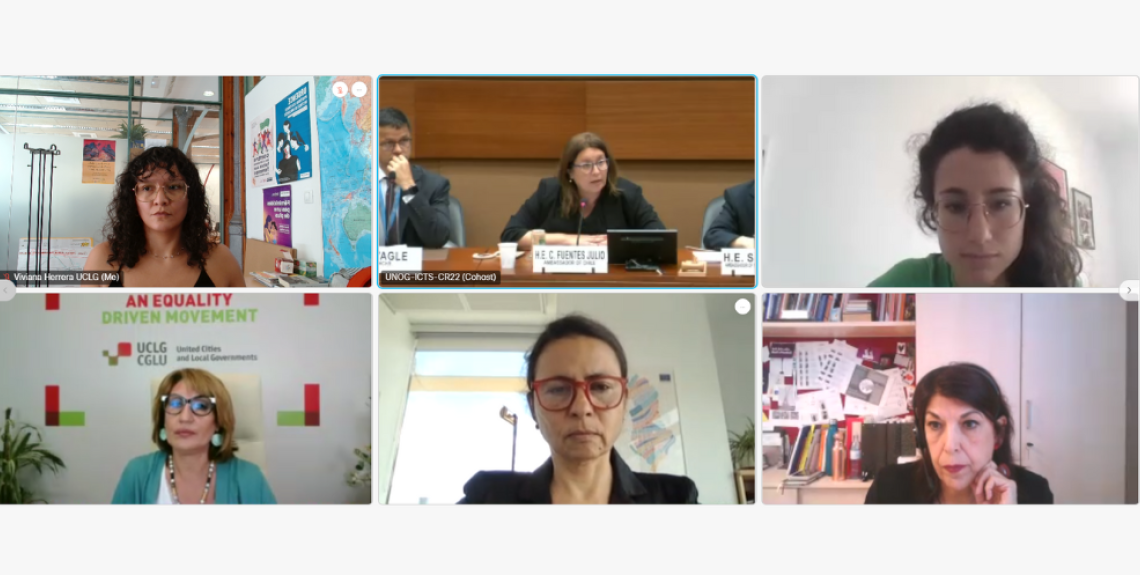On Thursday 4 July 2024, the meeting “Capacity building for local governments to realize human rights for all” took place in parallel to the 56th session of the Human Rights Council. The session was organised by the Permanent Missions of the Republic of Korea, Chile, Egypt, Romania and the Office of the United Nations High Commissioner for Human Rights (OHCHR) and was held at the Palais des Nations in Geneva. Emilia Saiz, Secretary General of United Cities and Local Governments (UCLG), participated online to share the challenges that local governments face in implementing human rights in general and UN human rights mechanisms in particular, as well as to reflect on how the UN system can assist local governments in this regard.
The session aimed to share the findings and discuss the implementation of the recommendations made by the HCHR in its "Summary report of the expert meeting on enhancing capacity building for local governments to mainstream human rights in all their work," celebrated in August 2023 in Geneva. Among its recommendations, the report invites local governments to join our global campaign ‘10, 100, 1000 Human Rights Cities and Territories by 2030’.
Learn more about our global campaign and join here
Opening the session, Claudia Fuentes Julio, Ambassador and Permanent Representative of Chile to the UN, called for strengthening the link between local governments and diplomacy to implement human rights.
To address the difficulties in their implementation, Seong deok Yun, Ambassador and Permanent Representative of Korea to the UN, proposed to translate UN resolutions and mechanisms into more practical tools and concrete actions. He also proposed the creation of a human rights policy framework for local and regional governments, to disseminate knowledge and improve understanding of human rights mechanisms.
Olivier de Schutter, UN Special Rapporteur on Extreme Poverty and Human Rights, encouraged to focus on the key role of local and regional governments and municipalities because they offer four specific advantages for the implementation of human rights: local democracy, cross-sectoral coordination, public procurement and capacity for innovation.
Elisa Morgera, Special Rapporteur on the promotion and protection of human rights in the context of climate change, contributed in the same vein and recognised the unique value of local and regional governments in localising the voices and experiences of human rights recipients in vulnerable situations, all sources of knowledge for addressing climate change.
Pradeep Wagle, Chief of the Economic, Social and Cultural Rights Section at OHCHR, drew attention to the need for a shift in the way cities are perceived, from being deemed mere recipients of human rights to partners in need of tools, guidance and capacity building. ‘Local and regional governments have a key role to play in the 2030 Agenda, not only in implementation but also in creating solutions.
Robert Lewis-Lettington, Head of UN-Habitat's Land, Housing and Shelter Section, brought to the forefront the contribution of local and regional government expertise to look at other key human rights issues, such as housing and homelessness, especially the impact on women and children. To this end, he called for the promotion of interdepartmental cooperation and the recognition of complementary roles of states, with greater sharing of information and responsibilities.
In the closing remarks of the session, Emilia Saiz brought to the forefront that our municipalist movement is key to the implementation of human rights, as it places them at the centre of local service provision, along with care and local democracy, in harmony with the planet and future generations. She encouraged incorporating this debate in other upcoming events to build the future of multilateral dialogue, such as the Summit of the Future (September 2024), the International Conference on Financing for Development (June 2025) and the World Social Summit (November 2025).


